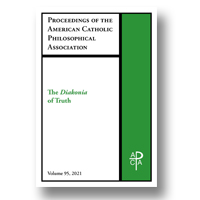|
session viii: a living thomism |
|
21.
|
Proceedings of the American Catholic Philosophical Association:
Volume >
85
R. Mary Hayden Lemmons
The Indeterminacy Thesis and the Normativity of Practical Reason
abstract |
view |
rights & permissions
| cited by
This paper argues against the indeterminacy thesis that attempts to defeat traditional natural law by asserting that specific moral norms cannot be based on human nature. As put by Jean Porter (Nature as Reason 2005, 338): “the intelligibilities of human nature underdetermine their forms of expression, and that is why this theory does not yield a comprehensive set of determinate moral norms, compelling to all rational persons.” However, if this were so, one could adopt any morality with impunity from nature’s sanctions. But I argue that nature punishes violators of the natural law in various ways. In addition, I argue that the indeterminacy thesis cannot be supported by appealing to the diversity of moral norms across the globe. Such diversity is required, for instance, both by the reliance of Thomistic natural law on the practical syllogism and by its reliance on practical reason’s ability to prescribe for the sake of the person in highly unique situations as required by Wojtyla’s Personalistic Norm and Aquinas’s norm of neighborly love.
|
|
|
|
|
22.
|
Proceedings of the American Catholic Philosophical Association:
Volume >
85
Vincent J. DeVendra
A Science With No Scientists?:
Faith and the First Principles of in Aquinas
abstract |
view |
rights & permissions
| cited by
The first question of Thomas Aquinas’s Summa Theologiae makes the argument that sacred doctrine is an Aristotelian science and, furthermore, the most certain of the sciences. According to Aristotle, this means that the first principles of sacred science must be certain. The normal modes of grasping the certainty of principles are either by demonstrating them by a higher science or by a direct grasp of them by the natural light of the agent intellect. Both of these avenues, however, are closed to sacred science. It would seem, then, that if sacred doctrine is a science, it can have no scientists in the wayfaring state. Aquinas unties this knot by proposing a third way of grasping the certainty of the first principles, namely, by faith. Only by the supernatural and graced assent of faith can the articles of faith be known as certain and allow sacred doctrine to fit into the mold of an Aristotelian science.
|
|
|
|
|
acpa reports and minutes |
|
23.
|
Proceedings of the American Catholic Philosophical Association:
Volume >
85
Minutes of the 2011 Executive Council Meeting
view |
rights & permissions
| cited by
|
|
|
|
|
24.
|
Proceedings of the American Catholic Philosophical Association:
Volume >
85
Secretary’s Report (2010–2011)
view |
rights & permissions
| cited by
|
|
|
|
|
25.
|
Proceedings of the American Catholic Philosophical Association:
Volume >
85
Treasurer’s Report (2010)
view |
rights & permissions
| cited by
|
|
|
|
|
26.
|
Proceedings of the American Catholic Philosophical Association:
Volume >
85
Financial Statements 2009 and 2010
view |
rights & permissions
| cited by
|
|
|
|
|
27.
|
Proceedings of the American Catholic Philosophical Association:
Volume >
85
Report of the Editor of ACPQ
view |
rights & permissions
| cited by
|
|
|
|
|
28.
|
Proceedings of the American Catholic Philosophical Association:
Volume >
85
Necrology (2011–2012)
view |
rights & permissions
| cited by
|
|
|
|
|
29.
|
Proceedings of the American Catholic Philosophical Association:
Volume >
85
Available Back Issues of the Proceedings
view |
rights & permissions
| cited by
|
|
|
|





